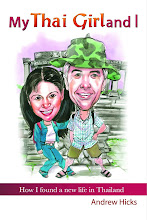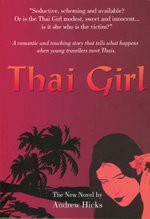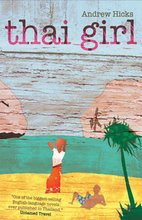
Bangkok's Hualampong station - waiting to go northwards.

But for Thais even eternal waiting can and should be fun.

An advert for Tiffy recalls the dramatic era of steam.

The station's busy with men in uniforms and local trains too.

The gateway to Chiang Mai and our train on the left platform.

The plains were flooded and it was still pouring by Lamphun.

At Lampang there was a fine old steam engine on display.

Wheels and couplings speak loudly as we clatter over a culvert.

There's light at the end of many a tunnel up in the mountains.

One of many mountain stations, much loved and immaculately maintained.
Nations are defined by wars and geography but it was its railways that finally integrated Thailand within its permanent borders.
Cat and I have just been on the overnight train from Bangkok to Chiang Mai and the journey back by day has reminded me what an extraordinary feat it was to construct a railway across the plains, through almost impenetrable jungle and mountains and up to the ancient kingdom of Lanna.
We’ve also recently been through the humiliating and barbaric process of applying for visas for Cat, both to go to the UK and also to get a Schengen visa for Europe. There is a link there somewhere!
After millennia of tribal warfare, the Schengen agreement between twenty one European nations now allows visitors to obtain a single visa valid for all these countries. How civilized it is to freely cross borders and how very sad that the UK stood apart and did not sign up to this accord. If only we now had just one visa to apply for on going to Europe.
Ease of travel in a modern world means that strict national borders are needed to separate and divide people, but we’re now so used to this intrusion that it’s easy to forget that the nation state itself is a brand new concept. Likewise, passports are something of a new thing. Italy and Germany are new countries and the United States was quite recently defined by its civil war.
And Thailand as we now know it is new too.
Relating things to my own lifespan, a warring Europe was pacified, the invaders were turned back and an extraordinary reconciliation was begun only two years before my birth. And not long ago Africa was abruptly carved into more than thirty artificial nations by the European powers at the end of the nineteenth century, driven on by the insatiable demands of their missionaries and traders. This all happened a mere twenty years before my father’s birth.
Despite the artificiality of some of the borders thus created, even in Africa the nation state has been extraordinarily successful with remarkably few annexations or secessions. Just like Vietnam’s eviction of Pol Pot from Cambodia, nobody liked it when Tanzania kicked Idi Amin out of Uganda as borders are sacrosanct and must not be violated even for good reason.
Eritrea successfully broke away from Ethiopia and Morocco has been too acquisitive, but the fledgling ‘state’ of Biafra, the biggest ever secession failed and Nigeria, Africa’s giant, remained intact, as does almost all of the late nineteenth century political map of the continent.
Now taught an assertive brand of nationalism, modern Thais may look at a map of South East Asia and believe that theirs is an ancient Kingdom but, as defined by its present borders, like so many other nations, relatively speaking it’s brand spanking new.
So what’s the story and why is this so?
Throughout history, where land is divided by insurmountable mountains, rivers and seas, political entities must of necessity be small and this region was no different in that respect. The old civilization of the Chao Phaya basin, of Sukotai and Ayutaya which lie at the core of Thailand, was closed off by mountains to the west, north and east. Those to the North isolated it from the kingdom of Lanna/ Chiang Mai, while the mountains to the east ensured that the Korat plateau and Isaan looked eastwards and could not be fully integrated by ‘the Thais’ from the west.
Thus the loose ‘empires’ of Burma, Thailand and Cambodia, not yet nations with settled borders, were in perpetual conflict as they sought to control the small vassal states around them and to extend their spheres of influence.
The mountains were of course the defining factor. But if you move mountains, everything changes, and that’s exactly what the railways achieved. During the reign of King Chulalongkorn, truly the architect and father of Thailand, construction of the great railways to the south, to the north and east of Thailand was courageously begun.
I’ve previously written of how the feat of cutting a railway over the mountains to Ubon in the east enabled Isaan to be better absorbed into a unified nation… which ironically the current political tensions suggest has not yet been perfectly achieved. (See ‘Last Train From Sikoraphum’ posted on this blog on 14 November 2008)
So now I want to tell you of our long daytime journey back from Chiang Mai by train, a slow and spectacular ride down through the mountains that again reminded me that before 1921 when the railway was finished, Chiang Mai and the Lanna kingdom was another world, a veritable Shangri La, hidden from the Thailand of the southern plains.
In the last few decades air travel has given us seven league boots and made the world smaller but the railways had a far greater impact than that. As a major breakthough in transportation, they redefined much of the political world, allowing access to outlying areas that could now be integrated politically and commercially exploited.
Not least of all this is how it happened in Thailand. It was the railways that were the essential means to make the nation what it is now.
The financing and construction of the Thai railways was a modern marvel of political will, organization and engineering. Crossing the plains was easy but surveying a route through the mountains, building cuttings, embankments, bridges and tunnels, especially a long one through the Khun Tan mountain, must have seemed an impossible project. At last the dream was achieved and served its purpose, though now the line is desperately in need of modernisation and has been left to gently molder in the shadow of its past glory.
Thus as the Chiang Mai train slowly approaches a tiny station high in the northern mountains, the station master is in his old clothes, busy manicuring its immaculate garden. He snaps to attention and rushes off to buff up his boots and to put on his best uniform and peaked cap. Just in time he grabs his green and red flags and makes it onto the platform as the train rumbles in.
Yes, they still wave their flags and they ding a big, polished brass bell to send the trains on their way. It’s just wonderful and nothing, but nothing seems to have changed. Steam has been exchanged for diesel, but the Thai railways still offer a perfect time warp for any nostalgic lover of the world’s quaintest old railways.
Not only travelling hopefully to Chiang Mai is fun but arriving’s even better. As always I greatly enjoyed the city and although it’s changed and grown, the atmosphere is much the same inside the moat as it was when I first visited and stayed in the seventies. The rice fields and mountains are still there too and rural life goes on much as it always has done. And so also do the trains.
The railway is thus the perfect link to help you to slow down and to take you from the madness of Bangkok to that other more gentle world of Chiang Mai. Even Bangkok’s Hualampong Station where your journey begins has been nicely restored and it retains its fine architecture and a polite otherworldliness.
It is always vibrant with people and activity but for Bangkok it’s strangely calm and orderly. The central hall is packed with people, but they just sit on the floor with their luggage surrounding them and they serenely wait as if forever, something the Thais are always so good at doing.
Perhaps they’re pleasantly anticipating the slow ride out through the slums and the shanties built literally feet from the passing trains, out through the sprawling city and onto the endless rice plains. After the long run across the plains, when Chang Mai is not so far away in distance but still a long way in time, their train will abruptly leave the rice fields and climb slowly up into the mountains.
It makes slow progress and you can see the train ahead of you as it rounds the sharp curves. You can feel the extraordinary steepness of the gradients as the train clatters over bridges and culverts. Its single track is but a precarious thread, dwarfed by the mountains and threatened by the encroaching jungle, more like a narrow gauge mountain railway than the important artery that first united Thailand.
In less than a hundred years though the railway has become insignificant and almost an irrelevance. Governments have repeatedly failed to modernize and to invest, caught in a power play with the railway unions who strike to preserve the privileges and inefficiences of an outdated system. It will take strong and determined leadership to give upgrading the railways the priority it deserves, which suggests that nothing much will change in a hurry.
In the meantime I’m not personally complaining about that.
Nothing for me could be better value or fun than a round trip on the train from Bangkok up to Chiang Mai and back. I’ve done it several times before and I hope this time won’t be my last.
@@@@@@@@@@@@@@@@@@@@@2@@@@@@@@@@@@
POSTSCRIPT… I’m no historian and have done no research whatsoever to write this piece so if you find it’s riddled with inaccuracies or can tell us more about the story of the railways, do please leave a Comment on this blog.
Andrew Hicks The “Thai Girl” Blog November 2009




















